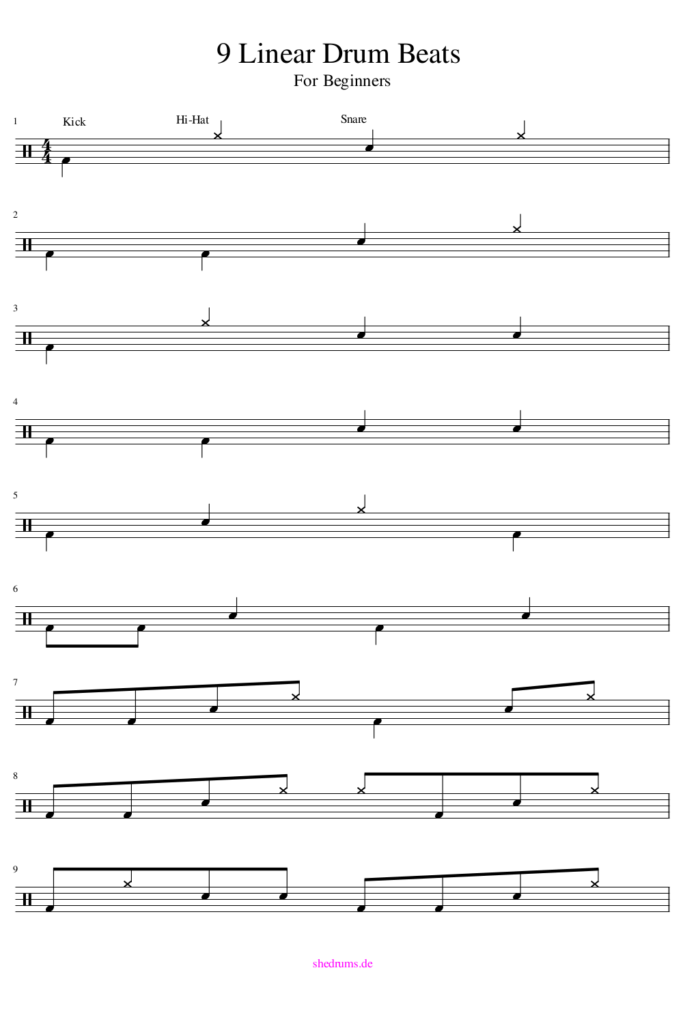Disclosure: This post may contain affiliate links (marked with *). If you click on these links and make a purchase, I may earn a small commission.

Linear drumming is awesome! Basically, you play one instrument at the time.
This gives you a lot of freedom to experiment with great drum beats.
However, it could be a little overwhelming to find the right starting point for starting out with linear drumming.
So I wrote this easy guide to help you master the basics of this really cool way of playing the drums today.
But first, let’s answer this important question:
What Is Linear Drumming?
As I said, linear drumming equals playing one instruments of your kit at a time.
It’s like playing the kick, the snare, the hi-hat and then again the snare drum.
You do not add a second layer to this linear drumming idea. No instrument is played simultaneously.
Let’s take a look at this piece of drums sheet music:
(You’ll find the full note PDF a little down below.)

As you can see, you do play each stroke after each stroke after each stroke.
It’s like a „line of drum sounds“.
Yes, that’s playing the drums linear style in quarters.
However, you can of course play various rhythms, note and rest values linear.
And HOW can you do so?
How To Start With Linear Drumming NOW
It’s important to notice that the basics of linear drumming actually are quite simple.
Remember:
You play one instrument of your drum kit at a time. No instrument is played simultaneously.
For this reason, try this quick exercise:
- Choose a time signature. Let’s pick 4/4.
- Decide which one note you like to play. We decide on quarter notes for showing purposes.
- Do choose three instruments. For example, bass, hi-hat and snare are a great starting point.
- Now, allocate the instruments! You can see the notes below.
- Download your free drum sheet music PDF and start practicing today.

Ok, those are basic principle of the linear drum style.
Plus some cool linear grooves.
Now, what else?
Start practicing today. But take it slow. Linear drumming might sound and feel different to you at first.
You might need to get used to it.
But soon, you’ll really enjoy this wonderful way of playing the drums.
When you do so, don’t stop.
Instead, take your drumming to the next level!
Tried & Tested Tips For Your Linear Drum Style
You see, drum stuff doesn’t need to be overly complex.
Actually, the basics can be – sometimes – considered pretty simple.
If you like to dig deeper into linear drumming, you need to learn more about it.
Play it.
Practice it.
Feel it.
And definitely use this awesome concept in a musical way!
You can find some great literature on the topic for more inspiration.
But first, start easy.
Did you already download the sheet music you stumbled upon?
Remember: It’s free and a superb pick for beginners.
However, also make sure to spice the beats up.
You can change the instruments, for example.
Or you could change the note values like instead of quarters, play sixteenth notes on your drums.
Maybe you even want to add rests?
It’s up to you.
You can also find really cool linear drum beats for beginners here. It’s drumlesson.com, by drumeo.
You will probably know, they have some GREAT drumming lessons available.
But I do not think I need to tell you. 😉
Also, check out the guide on how to play linear drum beats.
And Now: Start Practicing!
I have to say, I really love the linear drum style.
Surely, you’ll enjoy it too, soon.
But remember, this concept might give you a hard time when getting in touch with it the first time.
So make sure to don’t stress yourself out over learning it.
You have time and time’s on your side.
Cheers,


2 thoughts on “How To Master The Basics Of Linear Drumming Today”